First LegCo election under Hong Kong's new electoral system: Tough road ahead for non-pro-establishment candidates
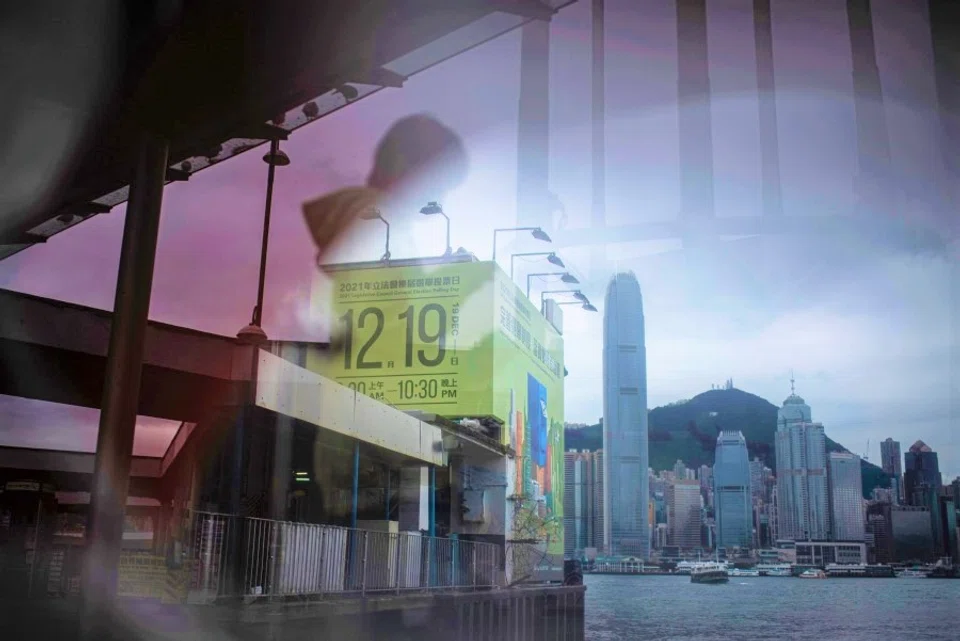
On 19 December, the seventh Hong Kong Legislative Council (LegCo) elections since the handover of Hong Kong will be held. However, the enthusiastic and extensive campaigning for votes by various political parties before is nowhere to be seen, unlike in previous elections.
On a recent Sunday (28 November), many candidates vying for seats in the Hong Kong Island East geographical constituency set up street booths to canvass voters. Amongst them was Stanley Ng Chau-pei from the Hong Kong Federation of Trade Unions whose booths were bedecked with campaign flags. Dividing his time between the various booths, he waved and smiled at residents along the way before asking after them, hoping to win them over with his sincerity.
This journalist observed that the locals' reactions were lukewarm and they even went out of their way to avoid Ng's booths. Petitions for quarantine-free travel to resume between Hong Kong and the mainland as soon as possible were also set up at many of these booths, but there were few signatories.
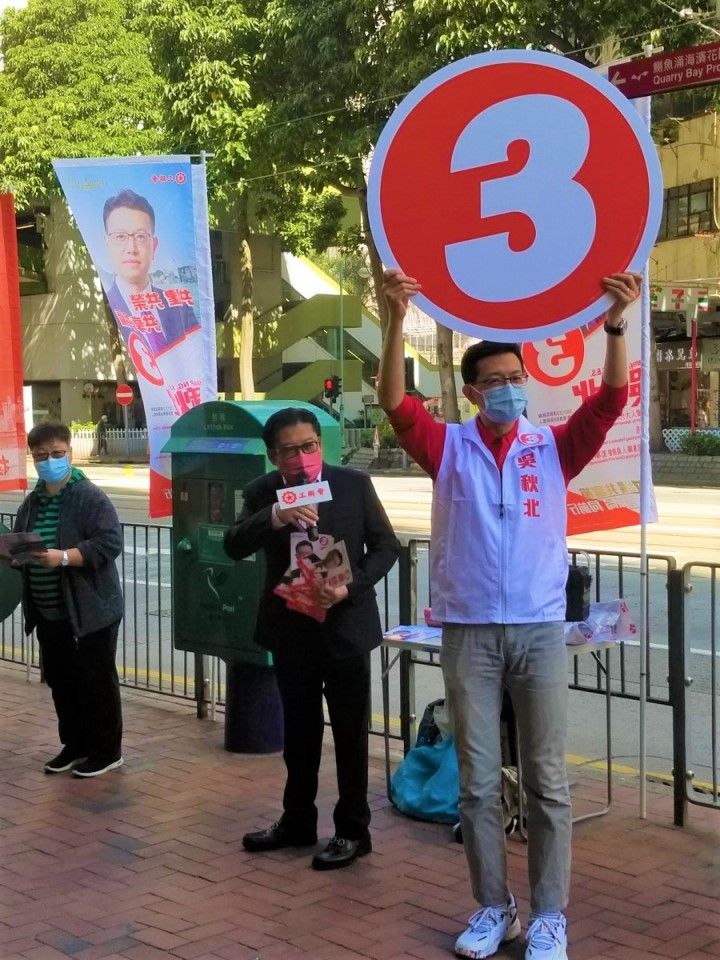
As the first LegCo election after China's National People's Congress amended the electoral system in Hong Kong, this election is very different from its predecessors. Under the new electoral system, the total number of seats in the LegCo has been raised from 70 to 90, but much fewer seats are now allocated to the geographical constituency direct election. In the 2016 LegCo election, the five geographical constituencies produced 35 lawmakers on a proportional representation basis. For the upcoming election, the number of geographical constituencies has been increased from five to ten, with each constituency returning two members, making up a total of 20 lawmakers.
In addition, the upcoming LegCo election also has a new nomination mechanism. On top of fulfilling the nomination requirements for the geographical or functional constituencies they are running for, candidates also have to be nominated by ten members of the some 1480-strong Election Committee, minimally two from each of the five sectors in the Election Committee.
With the number of seats available for direct election to the new LegCo reduced drastically and nomination made more arduous, pro-democracy parties such as the Democratic Party, the Civic Party, and the Hong Kong Association for Democracy and People's Livelihood made it clear earlier that they would not be taking part in the upcoming election, the first time they have failed to do so in recent decades.
Lo Kin Hei, chairman of the Democratic Party, the largest in the pan-democracy camp, said that his party will continue with their groundwork and hope that party members will "stay behind the party on this difficult journey".
In the absence of pro-democracy and localist parties, observers will also be keenly watching the willingness of locals to vote in the upcoming election.
154 nominations received for 90 LegCo seats
Nonetheless, after nomination ended, the Registration and Electoral Office announced that 154 nominations were received for the 90 LegCo seats available this time round. Amongst them, 13 (around 8% of all nominations) were submitted by those who are non-pro-establishment.
They include centrist candidates from parties such as the Path of Democracy and the Third Side, as well as Mandy Tam Heung-man, formerly of the People Power party. They are moderate democrats who advocate dialogue with the central government in Beijing.
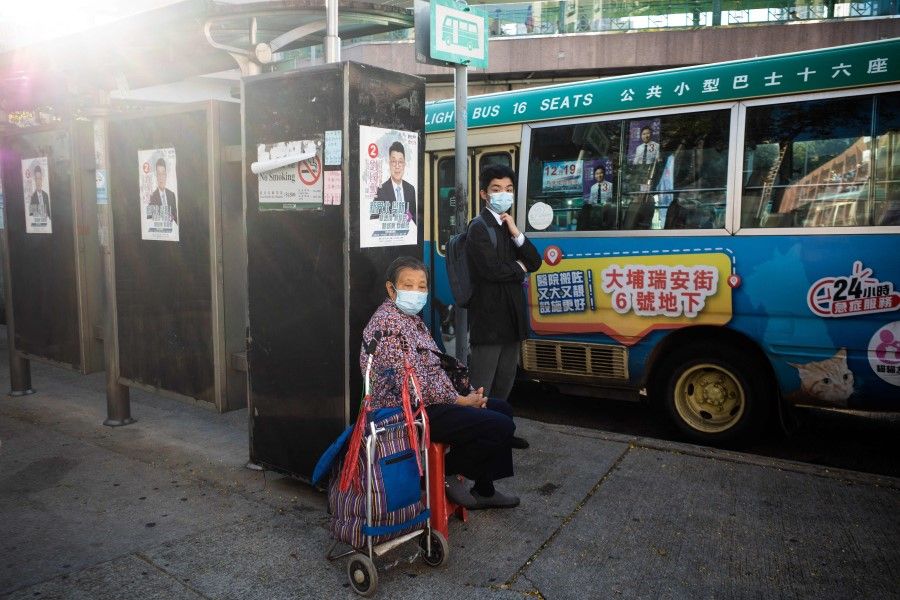
In the last two years or so, the political landscape in Hong Kong has been revamped. In the absence of pro-democracy and localist parties, observers will also be keenly watching the willingness of locals to vote in the upcoming election. On 23 November, the Hong Kong Public Opinion Research Institute published its findings from a survey it conducted. Out of all surveyed, only 52% indicated that they would vote in the upcoming election, a massive drop of 31% when compared to the findings of a similar survey carried out before the previous LegCo election five years ago, and the lowest figure since 1991.
Some 60% of survey participants did not know the candidates running in their constituencies, while quite a number of respondents indicated they did not know which constituency they belong to. More than 30% of those surveyed also replied that they are highly unlikely to or have decided not to vote, while another 10% have not decided.
In a recent newspaper article, Cheung Chi Kong, executive director of the One Country Two Systems Research Institute, opined that turnout for the geographical constituency direct election this time round is likely to be just over 20%, a stark contrast to the most recent local elections which took place in the midst of the 2019 Hong Kong protests with turnout in excess of 70%. Academic Benson Wong Wai Kwok also predicted that the turnout for the LegCo election will not exceed 30%.
A third way?
In reality, the (third) path away from pro-establishment and pro-democracy has always been a tough one to trudge in Hong Kong. In the last few years, Ronny Tong Ka-wah who resigned from his LegCo seat and withdrew from the Civic Party in 2015, has been trying to promote his think tank, the Path of Democracy, which is taking a centrist and elitist third path. However, the Path of Democracy only garnered 18,000 votes in the 2016 LegCo election, less than 1% of the total votes cast.
In the upcoming election, for the first time ever, the Path of Democracy has chosen to cooperate with the Third Side party, which also advocates taking the third path, in a bid to form a coalition with factions that are not pro-establishment in order to maximise their chances of winning.
Tong who is the convenor of the Path of Democracy, is of the opinion that there are many rational and moderate voters in Hong Kong who are more centrist with their democratic ideals, and the third path will appeal to this group.
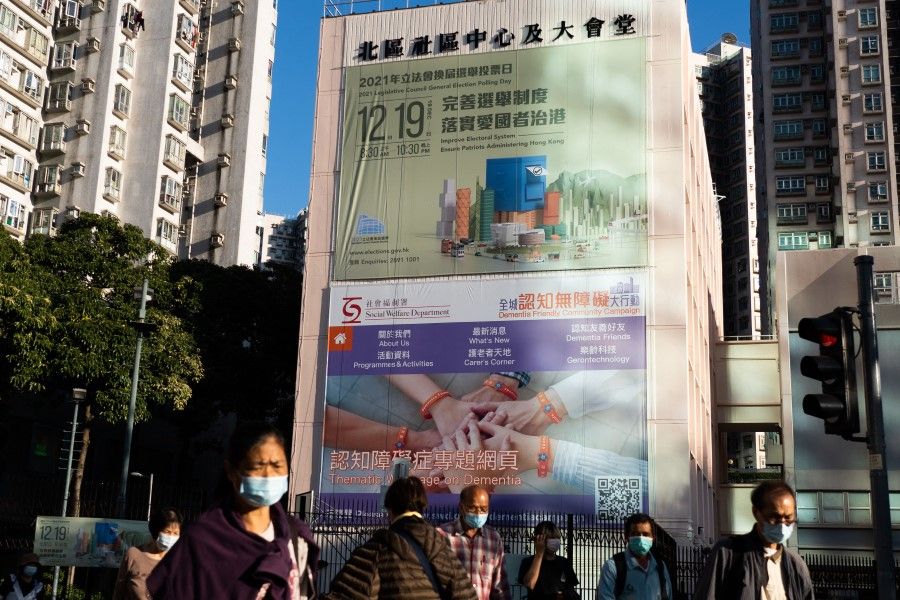
Judy Tzeng Li-wen who is the former secretary-general of the radical localist party People Power, is running for a seat in the New Territories North geographical constituency. She has shunned political issues in her campaigning, choosing to focus instead on fighting the outsized influence of real estate tycoons; greater oversight to curb collusions amongst government officials, businessmen, and indigenous inhabitants, and wastage of public funds; and monitoring white elephant government projects in the constituency.
When interviewed by Zaobao, Tzeng indicated that she hoped to be given a chance to oversee the Hong Kong government as a LegCo member on behalf of moderate, rational, and independent non-pro-establishment constituents. She would also continue to advocate for greater democracy in Hong Kong if elected.
Quite a few locals worry about the new political structure in Hong Kong. They feel that it is highly likely that the LegCo will be filled with pro-establishment members in future.
Former LegCo member, Frederick Fung Kin-kee, is a key figure of the moderate democratic parties. After leaving the Hong Kong Association for Democracy and People's Livelihood in 2018, he has failed in two elections, but is still participating this time round. When interviewed by Zaobao, he criticised the pro-establishment camp for siding with the chief executive on many occasions, providing her with support regardless of the policy. He hopes to provide voters with an alternative choice through his participation.
Fung emphasised that the pursuit of democracy has always been his political ideal. He also included dual universal suffrage in his manifesto. Nevertheless, Fung acknowledged that it would be challenging for him to win over the supporters of the traditional democratic parties.
According to Fung, "When I am out campaigning on the streets, I sometimes run into criticisms from some supporters of democratic parties. There were even those who continued scolding me even as I walked away, accusing me of being pro-Beijing."
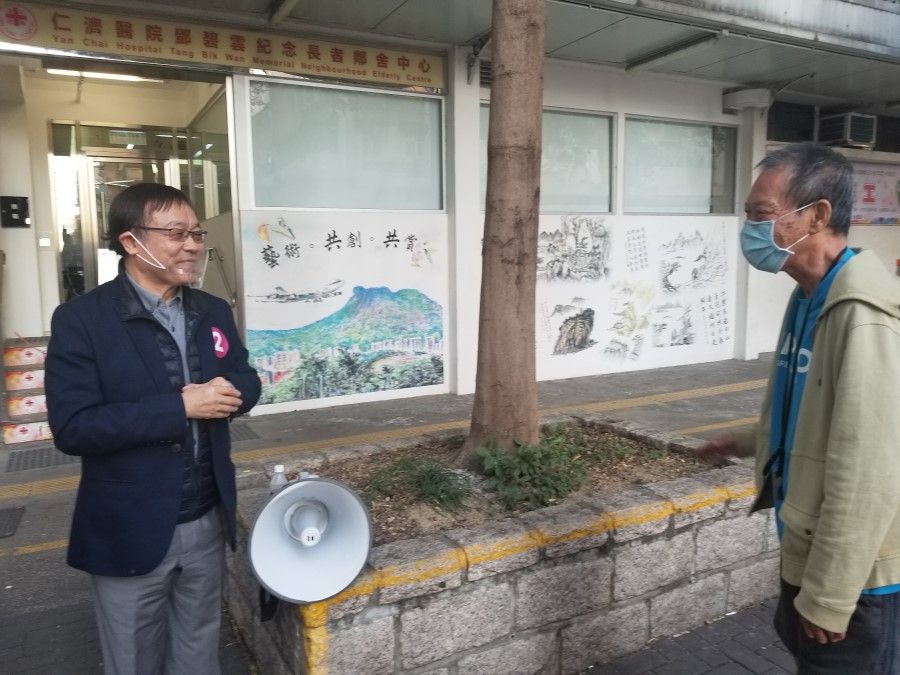
Less oversight of government?
Quite a few locals worry about the new political structure in Hong Kong. They feel that it is highly likely that the LegCo will be filled with pro-establishment members in future. To them, if the LegCo did not have legislators that Hong Kongers support, then its role of supervising the government would be diminished.
...only 2.5 hours on average was spent debating a bill before it is passed because the absence of pan democrats means that pointed exchanges between the pro-establishment and pro-democracy camps no longer occur. - Ivan Choy Chi-keung, senior lecturer, Government and Public Administration department, the Chinese University of Hong Kong
In an interview with the local media, Ivan Choy Chi-keung, a senior lecturer at the Government and Public Administration department of the Chinese University of Hong Kong, shared data on the speed at which the current LegCo passed recent bills as an example. The data showed that presently, only 2.5 hours on average was spent debating a bill before it is passed because the absence of pan democrats means that pointed exchanges between the pro-establishment and pro-democracy camps no longer occur.
Choy said, "Without having to worry about re-election, members no longer need to scrutinise government policies to prove themselves. In the long run, the LegCo's supervision of the government will weaken."
Can a LegCo that passes bills quickly reflect public opinion?
Choy questioned whether the LegCo with its current culture of passing bills so quickly is able to represent the views of different stakeholders, and fully reflect public opinion.
Sung Lap Kung, director of the Hong Kong Progress and Perfection Research Institute, also opined that a politically homogeneous LegCo would mean that unlike in the past, many livelihood motions, such as those on housing issues and wealth disparity would be passed without serious opposition. As for political motions, such as the enactment of Article 23 of the Hong Kong Basic Law, the lack of opposing opinions in the LegCo during debates may result in the seed of another social crisis being planted unwittingly.
But he also believes that after the term of the current government ends next July, Beijing will adopt a softer stance towards Hong Kong, such as extending an olive branch to the pro-democracy camp, to bring about social and economic progress.
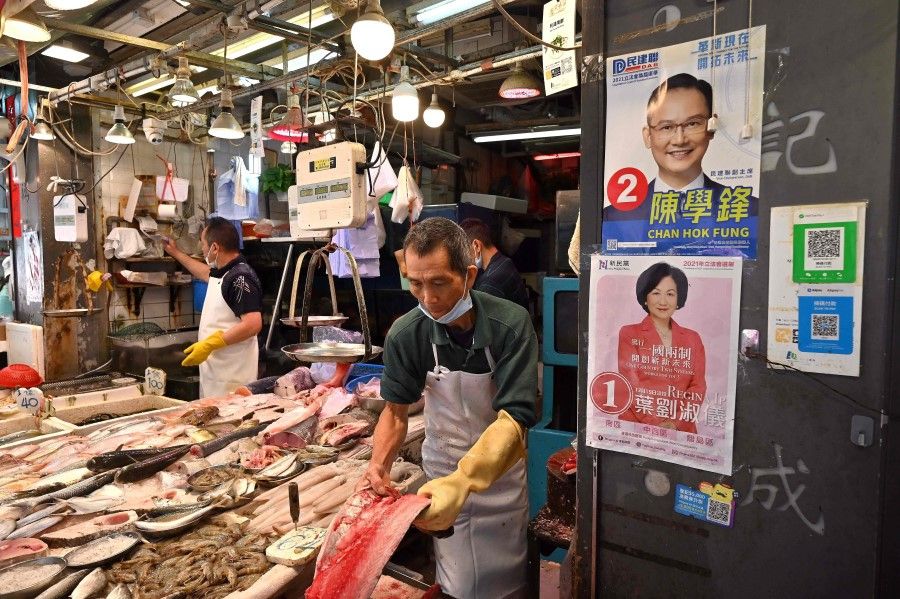
Non-pro-establishment candidates enjoy no advantage
Chan Wai-keung, lecturer at the Community College of the Hong Kong Polytechnic University, shared during an interview with Zaobao that the number of non-pro-establishment candidates contesting the upcoming election was more than he expected. He predicts that these candidates would be able to win two to four seats via direct election in the geographical constituencies.
Chan also pointed out that other than Frederick Fung who is running in the Kowloon West geographical constituency, another non-pro-establishment candidate, Jason Poon Chuk-hung, who is running in the Hong Kong Island East geographical constituency, also has a chance of winning because "there are more middle-class Hong Kongers residing in Hong Kong Island, and they prefer to support the democratic parties".
In an earlier interview with the local media, Sung also predicted that the non-pro-establishment camp has a chance of winning four to five seats in the upcoming election. But when interviewed by this journalist more recently, he changed his mind and predicted that the non-pro-establishment candidates may only win a seat for social welfare in the functional constituency and none via direct election.
Non-pro-establishment camp unable to mobilise supporters
Sung explained that he previously thought that as former LegCo members, non-pro-establishment candidates, such as Mandy Tam, Frederick Fung, and Nelson Wong Sing-chi could gain the support of voters with their visibility. However, based on what he saw recently, public response towards the election has been rather lukewarm. This coupled with subpar publicity efforts from the support teams of these candidates mean that supporters will be reluctant to vote, impacting their chances of winning.
...non-pro-establishment candidates who advocate forging a third path would find themselves in the difficult situation of ostracising everyone, and end up losing all in the direct election. - Sung Lap Kung, director of the Hong Kong Progress and Perfection Research Institute
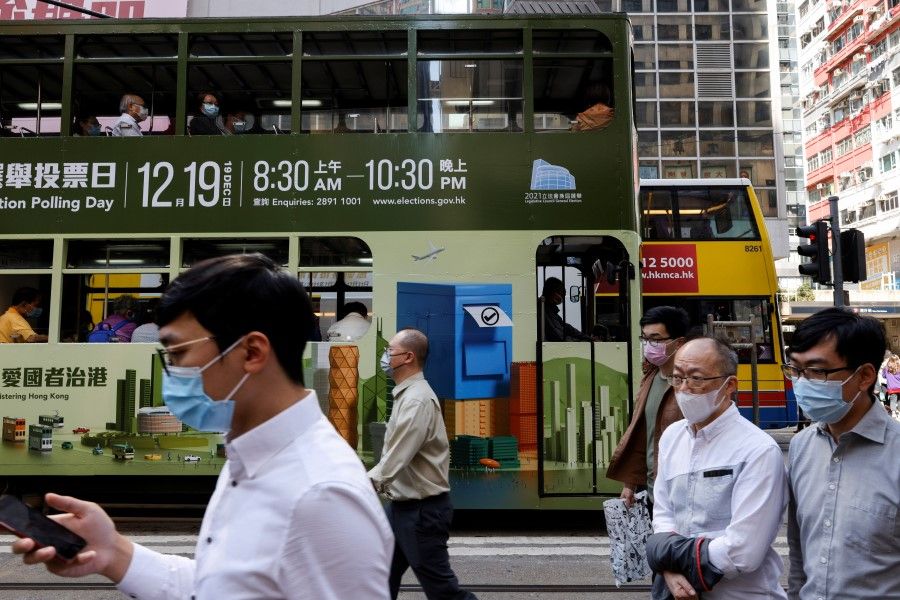
Using Frederick Fung as an example, Sung explained that in the Kowloon West geographical constituency that Fung is contesting, the streets were decorated with the flags and banners of candidates as early as a month before voting day in previous elections. "But the atmosphere of this year's election has been rather flat. Many non-pro-establishment voters feel that Fung betrayed the pro-democracy camp, and are unwilling to vote for him again," said Sung.
In reality, fulfilling the nomination criteria was already a tall order for the non-pro-establishment candidates. For instance, the Path of Democracy party intended to field four candidates, but struggled to meet the nomination criteria. It was only after a public appeal for help that the party managed to successfully file nomination submissions for three of its candidates.
Sung feels that non-pro-establishment candidates who advocate forging a third path would find themselves in the difficult situation of ostracising everyone, and end up losing all in the direct election.
He said, "On one hand, pro-establishment supporters regard these candidates as outsiders, on the other hand, they are also out of favour in the pro-democracy camp, so no one is coming forward to lend them support, and the supporters of the conventional pro-democracy parties may not vote for them too."
Related: Overhaul of Hong Kong's electoral system: Is it still 'one country, two systems'? | Resignation of university presidents in Hong Kong: Can politics and education be kept separate? | Every man for himself as Hong Kong's opposition caves under weight of national security law | When will the CCP stop being an 'underground party' in Hong Kong? | National security law for Hong Kong: Will America's 'smart sanctions' work against China? | Beijing tightens control over Hong Kong amid political reshuffle and arrests | Hong Kong must be governed by 'patriots'. So who are the 'patriots'?
